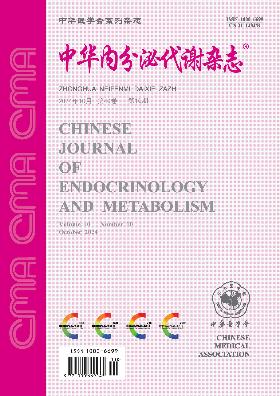增敏素是败血症的新治疗靶点
Q4 Medicine
引用次数: 0
摘要
2019年11月,一篇题为“内源性Icretin激素和外源性增量素类药物对脓毒症的治疗作用”的文章发表在JCEM上[Faraaz AS,Hussain M,Teresa GM,et al.J Clin Endocrinol Metab,2019104(11):5274-5284]。在获得该杂志的版权后,我们将这篇文章翻译成了中文。脓毒症目前被定义为一种由宿主感染调节失调引起的危及生命的器官功能障碍,如果与血糖异常相结合,会增加器官功能障碍和死亡的风险。因此,作者认为有必要找到治疗败血症和维持血糖稳态的新靶点。肠促生长素可以调节多种功能,包括胰岛激素分泌、血糖浓度、脂质代谢、肠道运动、食欲、体重、免疫功能等。在这项小型回顾性研究中,作者使用医学关键词“肠促生长素”、“胰高血糖素样肽-1”、“胃抑制肽”、“炎症”和“败血症”进行Pubmed搜索。临床前研究模型和临床试验的结果表明,基于肠促胰岛素的治疗可以改善免疫功能,有效控制血糖,降低器官功能障碍的发生率和死亡率。然而,作者认为,仍需要进一步的临床研究来观察肠促生长素对败血症的影响。总之,如果引起人们对脓毒症肠促生长素轴的关注,可能有一种方法可以维持血糖稳态,同时减少炎症并改善临床结果。关键词:败血症;增量蛋白本文章由计算机程序翻译,如有差异,请以英文原文为准。
Incretin-the new therapeutic target of sepsis
An article entitled " Therapeutic Effects of Endogenous Icretin Hormones and Exogenous Incretin-Based Medications in Sepsis" was published in November 2019 in JCEM[Faraaz AS, Hussain M, Teresa GM, et al. J Clin Endocrinol Metab, 2019, 104(11): 5274-5284]. We translated this article into Chinese after obtaining the copyright from the journal. Sepsis is currently defined as a life-threatening organ dysfunction caused by a host′s dysregulation of infection which can increase the risk of organ dysfunction and death if combined with abnormal blood glucose. For that reason, the authors believe that there is a need to find new targets for the treatment of sepsis and maintenance of blood glucose homeostasis. Incretin can regulate various functions, including islet hormone secretion, blood glucose concentration, lipid metabolism, intestinal motility, appetite, body weight, immune function, and so on. Nowadays the research on incretin in sepsis is still limited. The authors utilized the medical keywords " incretin" , " glucagon-like peptide-1" , " gastric inhibitory peptide" , " inflammation" and " sepsis" for Pubmed search in this small retrospective study. The results of preclinical research models and clinical trials suggest that incretin-based therapies can improve immune function, control blood glucose effectively and reduce the incidence and mortality of organ dysfunction. However, the authors believe that further clinical studies are still needed to observe the effects of incretin on sepsis. In summary, there is probably a way to maintain blood glucose homeostasis while reducing inflammation and improving clinical outcomes if the incretin hormone axis in sepsis is brought to attention.
Key words:
Sepsis; Incretin
求助全文
通过发布文献求助,成功后即可免费获取论文全文。
去求助
来源期刊

中华内分泌代谢杂志
Medicine-Endocrinology, Diabetes and Metabolism
CiteScore
0.60
自引率
0.00%
发文量
7243
期刊介绍:
The Chinese Journal of Endocrinology and Metabolism was founded in July 1985. It is a senior academic journal in the field of endocrinology and metabolism sponsored by the Chinese Medical Association. The journal aims to be the "Chinese broadcaster of new knowledge on endocrinology and metabolism worldwide". It reports leading scientific research results and clinical diagnosis and treatment experience in endocrinology and metabolism and related fields, as well as basic theoretical research that has a guiding role in endocrinology and metabolism clinics and is closely integrated with clinics. The journal is a core journal of Chinese science and technology (a statistical source journal of Chinese science and technology papers), and is included in Chinese and foreign statistical source journal databases such as the Chinese Science and Technology Papers and Citation Database, Chemical Abstracts, and Scopus.
 求助内容:
求助内容: 应助结果提醒方式:
应助结果提醒方式:


